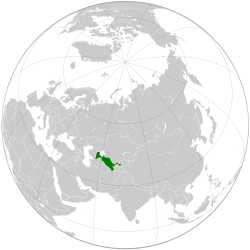
Uzbekistan is a doubly landlocked country in Central Asia. Uzbekistan's economy relies mainly on commodity production, including cotton, gold, uranium, and natural gas. Despite the declared objective of transition to a market economy, its government continues to maintain economic controls which imports in favour of domestic "import substitution".[ citation needed ]
Contents
For further information on the types of business entities in this country and their abbreviations, see "Business entities in Uzbekistan".


